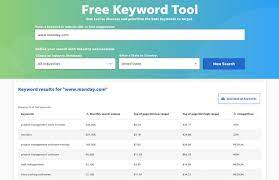Website Keyword Analysis: A Comprehensive Guide
In the world of digital marketing, keywords play a crucial role in driving traffic to your website and improving its visibility on search engines. Conducting a thorough keyword analysis is essential to understand what terms and phrases your target audience is searching for online.
What is Keyword Analysis?
Keyword analysis involves researching and identifying the specific words and phrases that people use when searching for information related to your business or industry. By understanding these keywords, you can optimise your website content to align with what your audience is looking for.
Why is Keyword Analysis Important?
Effective keyword analysis helps you:
- Improve SEO: By incorporating relevant keywords into your website content, you can improve your search engine rankings and attract more organic traffic.
- Understand Customer Intent: Keywords provide insights into what users are looking for, helping you tailor your content to meet their needs.
- Stay Ahead of Competitors: Analysing keywords used by competitors can give you a competitive edge and help you identify new opportunities.
- Enhance PPC Campaigns: For pay-per-click advertising, choosing the right keywords can increase the effectiveness of your campaigns and drive more qualified leads.
How to Conduct Keyword Analysis
The process of keyword analysis typically involves:
- Keyword Research: Use tools like Google Keyword Planner, SEMrush, or Ahrefs to identify relevant keywords with high search volume and low competition.
- Competitor Analysis: Analyse the keywords used by your competitors to understand their strategies and identify gaps you can exploit.
- Keyword Mapping: Organise your chosen keywords into categories based on relevance and search intent to guide content creation.
- Monitor and Adjust: Regularly review the performance of your chosen keywords and make adjustments based on changing trends or search patterns.
In Conclusion
Website keyword analysis is a fundamental aspect of digital marketing that can significantly impact the success of your online presence. By investing time and effort into researching and selecting the right keywords, you can enhance your SEO efforts, attract more qualified leads, and ultimately achieve better results for your business.
Five Key Benefits of Website Keyword Analysis for Enhanced Digital Strategy
- Improves SEO rankings by targeting relevant keywords
- Helps understand customer search intent and preferences
- Provides insights into competitor strategies and opportunities
- Enhances the effectiveness of pay-per-click advertising campaigns
- Guides content creation for better alignment with audience needs
Challenges in Website Keyword Analysis: 7 Common Pitfalls to Avoid
- Keyword analysis can be time-consuming, requiring thorough research and analysis.
- Over-reliance on popular keywords may lead to stiff competition and difficulty in ranking.
- Constantly changing search algorithms can affect the relevance and effectiveness of chosen keywords.
- Misinterpreting keyword data may result in targeting the wrong audience or creating irrelevant content.
- Keyword cannibalisation can occur when multiple pages on a website target the same keywords, leading to confusion for search engines.
- Neglecting long-tail keywords in favour of broad terms may limit the diversity of traffic sources to the website.
- Ignoring user intent when selecting keywords can result in high bounce rates and low engagement.
Improves SEO rankings by targeting relevant keywords
Targeting relevant keywords through website keyword analysis is a powerful strategy that can significantly improve SEO rankings. By identifying and incorporating the right keywords into your website content, you can increase your visibility on search engine results pages and attract more organic traffic. Search engines value relevance, so aligning your content with the terms and phrases that your target audience is searching for can help boost your website’s ranking position and ultimately drive more qualified visitors to your site.
Helps understand customer search intent and preferences
Understanding customer search intent and preferences is a key benefit of website keyword analysis. By analysing the specific words and phrases that users are searching for, businesses can gain valuable insights into what their target audience is looking for online. This knowledge allows companies to tailor their website content to better meet the needs and expectations of their customers, ultimately improving user experience, increasing engagement, and driving more relevant traffic to their site. By aligning content with customer search intent, businesses can enhance their overall digital marketing strategy and achieve greater success in reaching and converting their target audience.
Provides insights into competitor strategies and opportunities
Website keyword analysis offers valuable insights into competitor strategies and opportunities by allowing businesses to identify the keywords their competitors are targeting. By analysing competitor keywords, businesses can gain a better understanding of the competitive landscape, uncover gaps in their own keyword strategy, and discover new opportunities to differentiate themselves in the market. This information enables businesses to refine their SEO and content strategies, stay ahead of the competition, and capitalise on untapped markets for increased visibility and growth.
Enhances the effectiveness of pay-per-click advertising campaigns
Website keyword analysis enhances the effectiveness of pay-per-click advertising campaigns by enabling businesses to target the most relevant and high-performing keywords in their ads. By conducting thorough keyword research, businesses can identify the terms and phrases that are most likely to attract their target audience and drive conversions. This targeted approach not only increases the click-through rate of PPC ads but also improves the quality score, leading to lower costs per click and higher ROI for the advertising campaigns.
Guides content creation for better alignment with audience needs
Website keyword analysis guides content creation by providing valuable insights into the specific words and phrases that resonate with the target audience. By understanding what keywords are commonly searched for, website owners can tailor their content to better align with the needs and interests of their audience. This proactive approach ensures that the content produced is not only relevant but also more likely to attract and engage users, ultimately leading to improved user experience and higher conversion rates.
Keyword analysis can be time-consuming, requiring thorough research and analysis.
One significant drawback of website keyword analysis is the time-consuming nature of the process. Conducting thorough research and analysis to identify relevant keywords can be a time-intensive task that requires careful consideration and attention to detail. This can be particularly challenging for businesses with limited resources or tight deadlines, as investing the necessary time and effort into keyword analysis may divert attention from other marketing activities. Despite its importance, the time commitment involved in keyword analysis can be a barrier for some businesses looking to optimise their online content effectively.
Over-reliance on popular keywords may lead to stiff competition and difficulty in ranking.
An important con of website keyword analysis is the risk of over-reliance on popular keywords, which can result in stiff competition and difficulty in ranking. When businesses focus solely on using the most popular keywords, they often find themselves competing against numerous other websites vying for the same top spots in search engine results. This intense competition can make it challenging to achieve high rankings, as established websites with strong authority may already dominate those popular keyword searches. As a result, diversifying keyword strategies and incorporating long-tail or niche keywords can be essential to avoid getting lost in the sea of competitors and improve overall search visibility.
Constantly changing search algorithms can affect the relevance and effectiveness of chosen keywords.
Constantly changing search algorithms pose a significant challenge to website keyword analysis. As search engines regularly update their algorithms to improve user experience and combat spammy practices, the relevance and effectiveness of chosen keywords can be greatly impacted. Keywords that were once driving significant traffic to a website may suddenly become less effective or even obsolete due to algorithm changes. This dynamic nature of search algorithms requires website owners and digital marketers to stay vigilant, continuously monitor keyword performance, and adapt their strategies to ensure their content remains optimised for search engine visibility.
Misinterpreting keyword data may result in targeting the wrong audience or creating irrelevant content.
Misinterpreting keyword data in website keyword analysis can lead to significant drawbacks, such as targeting the wrong audience or producing irrelevant content. When keywords are misunderstood or misinterpreted, there is a risk of attracting visitors who are not genuinely interested in the products or services offered on the website. This can result in lower conversion rates and wasted marketing efforts. Additionally, creating content based on inaccurate keyword analysis may fail to resonate with the intended audience, leading to a disconnect between what users are searching for and what the website provides. It is crucial to conduct thorough and accurate keyword analysis to ensure that the right audience is targeted and relevant content is delivered effectively.
Keyword cannibalisation can occur when multiple pages on a website target the same keywords, leading to confusion for search engines.
Keyword cannibalisation is a significant drawback of website keyword analysis, as it can result in multiple pages competing for the same keywords. This phenomenon can cause confusion for search engines, making it challenging for them to determine which page is the most relevant to display in search results. As a result, the overall visibility and ranking of the website can be negatively impacted, potentially leading to a decrease in organic traffic and conversions. Addressing keyword cannibalisation through careful keyword mapping and content optimisation is crucial to avoid diluting the effectiveness of SEO efforts and ensure a coherent online presence.
Neglecting long-tail keywords in favour of broad terms may limit the diversity of traffic sources to the website.
Neglecting long-tail keywords in favour of broad terms may limit the diversity of traffic sources to the website. Long-tail keywords, although less commonly searched for individually, collectively make up a significant portion of search queries and can attract more targeted and qualified traffic. By focusing solely on broad keywords, a website may miss out on potential visitors who are using specific, niche terms to find relevant content. Diversifying keyword strategy to include long-tail variations can broaden the reach of a website and attract a more diverse audience, ultimately enhancing overall traffic quality and engagement.
Ignoring user intent when selecting keywords can result in high bounce rates and low engagement.
Failing to consider user intent when choosing keywords for website optimisation can lead to detrimental consequences, such as increased bounce rates and poor engagement levels. When keywords do not align with what users are actually searching for or expecting to find, they are more likely to leave the site quickly without engaging with the content. This disconnect between keyword choice and user intent can hinder the effectiveness of digital marketing efforts and ultimately impact the overall success of a website. It is crucial to prioritise understanding user behaviour and preferences to ensure that selected keywords resonate with the target audience and drive meaningful interactions.




